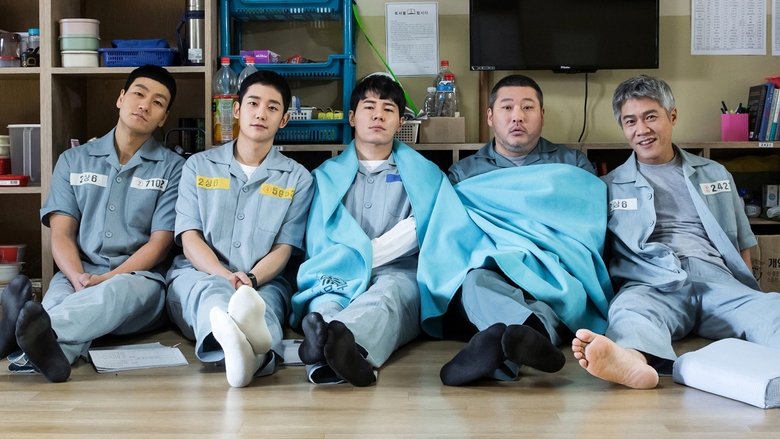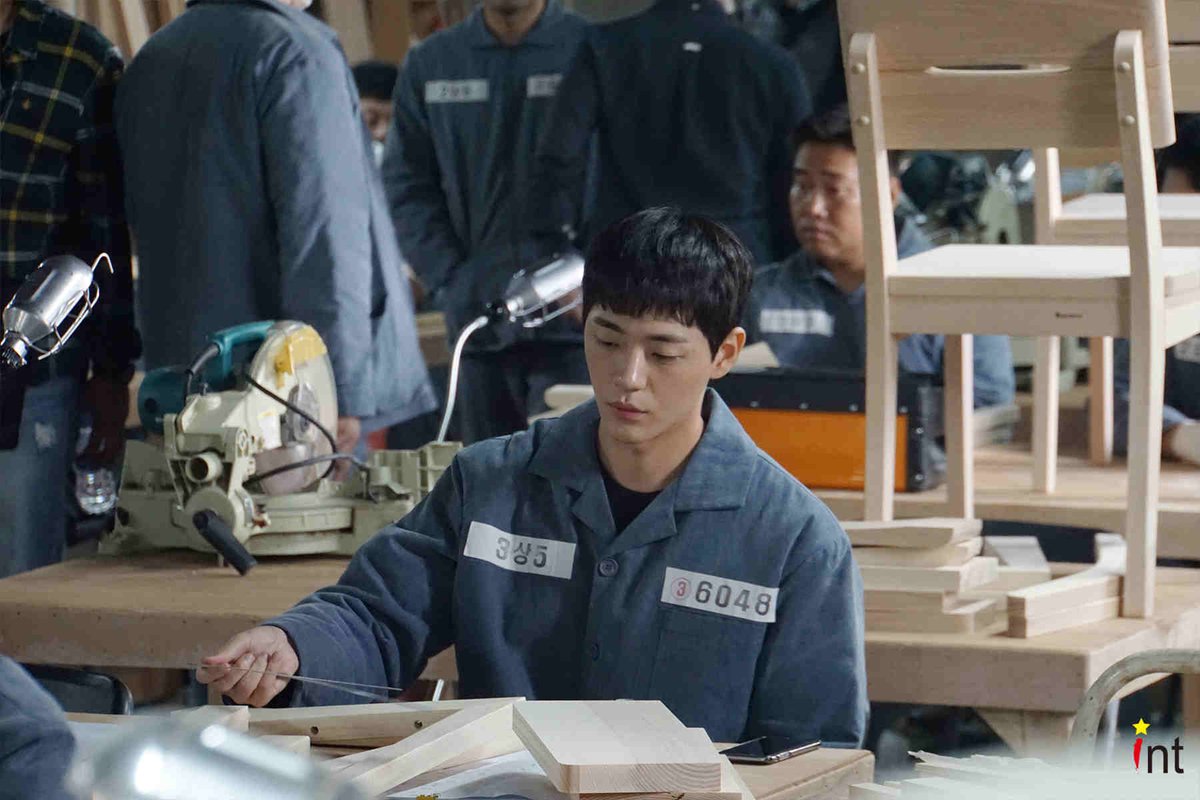
⭐️⭐️⭐️⭐️
The 2017-2018 Korean television series starring Park Hae-Soo as Kim Je-Hyeok, Jung Kyung-Ho as Lee Joon-Ho, and Krystal Jung as Kim Ji-Ho.

Brief synopsis: Kim Je-Hyeok is one of the best baseball pitchers in Korea, ready to make his way into the Boston Red Sox. But his plans take a dramatic turn when he saves his sister from sexual assault and kills the assailant. The court deems his actions justified but also as excessive violence and Kim Je-Hyeok is sentenced to a year in prison. The dunce Kim Je-Hyeok might only be saved from the dangers of prison life by an unlikely correctional officer, who just happens to be his best friend from high school.

First off: wow. Just... wow. This drama was impressive in a lot of ways.

1) The secondary and side characters. All of them influenced the story in one way or another. I think I’ll remember that about this drama the most— how they moved me. From the beginning down to the final episode, each side character had something to offer. Especially as we examined the inmates in Kim Je-Hyeok’s cell in Seobu Penitentiary, we got greater insight on the variety of situations inmates could be in and what they did with their time in prison.

Kim Min-Chul’s part of the story was especially inspiring. An inmate for the last 22 years where our story picks up, he’s done all he can to better himself. He’s strengthened religious convictions and earned himself several certifications, but he doesn’t really believe that a day could come that he would actually leave prison. Or if he does, he doesn’t believe life outside the penitentiary will be any better than it has been inside it. But it doesn’t feel right to leave such a kind, humble person to a miserable fate. Our characters don’t think so, either. So our hearts melted as we watch Kim Min-Chul learn that he is cared for and has people waiting to start a new chapter with him, whenever he is finally released.

Crony also proved to be a bigger part of the story than we thought. In the first half of the drama, he had to be one of the creepier antagonists. Pretty malicious. But Kim Je-Hyeok’s idea to win Crony over with a much more tender approach was golden. He had Crony figured out— he was driven by having a job to do. As soon as Je-Hyeok found a new direction to steer Crony he could then show him what could be gotten from spending your time on something good in nature, rather than something destructive. Crony also proved himself to be one heck of a heartthrob.

2) I wouldn’t have guessed the mood and tone of this drama just from hearing about it. It sounded like a rather serious, maybe dark theme for a drama but I didn’t know it would be so quirky! This drama has plenty to offer for comedic relief, almost as much suspense and feels. We laughed when Kim Je-Hyeok’s inmates did something dorky or when Lee Joon-Ho slapped his brother with a pillow, but we also stopped breathing whenever one of the antagonists made a move and nearly cried when some of the more beloved characters faced a disappointment.

The drama isn’t really romantic, but that won’t stop you from shipping Joon-Ho and Kim Je-Hee, as well as Je-Hyeok and Ji-Ho.

3) Lieutenant Paeng was, hands down, my favorite part of the drama. And I started watching for Jung Kyung-Ho in the first place, so it’s saying a lot coming from me. I’m pretty sure I started liking him so much as we discovered his fascination with Frank Sinatra’s “My Way,” but I think I kept liking his character because I recognized his character’s determination to see his inmates do better and make better decisions. He said no kid would be interested in the job of a corrections officer, but htat’s just ignorance talking. In episode 16 as he was explaining his job, he said “I help people denounce their crime and repent.” A lot of ignorant people, occasionally including children, think that a prison is just a place to keep bad guys away, to keep them from causing more harm to the community. But Lieutenant Paeng understood his job and the penitentiary as something more: Yes, the inmates therein may have made some poor decisions and done terrible things, but they weren’t there just to be isolated from everywhere else— they were just people needing to become better people. The real pity was that some of those people didn’t want to become better or weren’t willing to put down their greed or hate, or were not willing to do the work necessary, and it proved more destructive for their progress in the long run.

4) Kim Min-Sung: “It was my fault. I should have tried harder.”
Kim Je-Hyeok: “What more could you have done? You were just never given the opportunity.”
Any student who has felt like they’ve given everything in them until they’re barely a shell of a person can relate to this dialogue. Min-Sung feels guilt that he didn’t give enough attention to his job or his studies and that got him sentenced in prison, but it’s obvious to us as he keeps explained to Kim Je-Hyeok that he was wringing himself dry to succeed and still ended up failing. We’d like to think that hard work will always result in success, but this part of the drama embraces the reality that sometimes it just doesn’t happen that way. But why? Are we to blame ourselves, even if there was no deficiency in our method? Success isn’t defined as hard work, but rather as hard work plus opportunity. so when you feel like you’ve given everything and what you’re working so hard for didn’t work out, relax. Take a step back and take a deep breath. It doesn’t mean you were lacking— it just means it was not your opportunity. Wait in patience, and maybe an opportunity just meant for you will come your way.

5) I’m a real sucker for Jung Kyung-Ho. He’s very talented in his work and I was amused that he wasn’t in the lead role, but by the end of episode 2 I could understand why. His part in this drama is crucial and we don’t love him any less, but the main role of Kim Je-Hyeok was obviously well-suited for Park Hae-Soo. This was sure evidence of prudent casting directors that I appreciated— putting the better fit as the lead even though the other main actor had more fame.

But there was one thing I disliked about this drama: it’s got consistent terrible language, for all 16 90-minute episodes. By nature, the drama swears a lot even in Korean, but I blame Netflix for subtitle translation inconsistencies. There were plenty of words I recognized in Korean that could have been mellowed down for sensitive viewers, but I’m sure I got their coarsest translations. This drama could have been rated TV-MA for the weird gay-assault stuff with Chief Yeom, but it couldn’t have held a candle to all the cursing. It even made me laugh when Lee Joon-Ho in the drama realized “Hey. We swear a lot. Here, take this water and wash your ears of such filth.” By general terms considering the wide demographic of audiences, foul language was bit excessive.

The poor choice of language-fillers deteriorated from the meaningful dialogue, but the drama itself was good for feels, laughs, and food for thought. 4/5 stars!

Comments
Post a Comment